1. Korea Ministry of Food and Drug Safety. Strategic Report of Smart Healthcare Devices and Technology Standards. Cheongju, Korea: Ministry of Food and Drug Safety;2018.
2. Song JY, Peck KR. Korean Society of Infectious Diseases. A debate on public health responses to COVID-19: focused protection versus sustained suppression. J Korean Med Sci. 2020; 35(49):e433. PMID:
33350189.

3. Choi M, Kim M, Kim JA, Chang H. Building consensus on the priority-setting for national policies in health information technology: a Delphi survey. Healthc Inform Res. 2020; 26(3):229–237. PMID:
32819041.

4. Bevan G, Helderman JK, Wilsford D. Changing choices in health care: implications for equity, efficiency and cost. Health Econ Policy Law. 2010; 5(3):251–267. PMID:
20478104.

5. Kissick WL. Medicine’s Dilemmas: Infinite Needs Versus Finite Resources. London, UK: Yale University Press;1994.
6. World Health Organization. Supporting National Health Policies, Strategies, Plans. Geneva, Switzerland: World Health Organization;2022.
7. National Health Service. The NHS Long Term Plan. London, UK: National Health Service;2019.
8. Ministry of Health Labour and Welfare. Japan Vision: Health Care 2035. Tokyo, Japan: Ministry of Health, Labour and Welfare;2015.
9. Lee HJ, Kim S, Jang SI, Park EC. Current status of health and welfare long-term plans in Korea. Health Policy Manag. 2019; 29(3):368–373.
10. Austin P, Henderson S, Power I, Jirwe M, Alander T. An international Delphi study to assess the need for multiaxial criteria in diagnosis and management of functional gastrointestinal disorders. J Psychosom Res. 2013; 75(2):128–134. PMID:
23915768.

11. Rayens MK, Hahn EJ. Building consensus using the policy Delphi method. Policy Polit Nurs Pract. 2000; 1(4):308–315.

12. Park EC, Lee HJ, Kim S. Roadmap for Establishing Health Care System in Korea. Seoul, Korea: National Academy of Medicine of Korea;2019.
13. Kleczkowski BM, Roemer MI. National Health Systems and Their Reorientation Towards Health for All: Guidelines for Policy-Making. Geneva, Switzerland: World Health Organization;1984.
14. Park EC, Jang SI. The diagnosis of healthcare policy problems in Korea. J Korean Med Assoc. 2012; 55(10):932–939.

15. Park M, Youn HM, Park EC. Position value for relative comparison of healthcare status of Korea in 2019: comparison with countries of the Organization for Economic Cooperation and Development. Health Policy Manag. 2022; 32(1):113–121.
17. World Health Organization. The World Health Report 2000: Health Systems: Improving Performance. Geneva, Switzerland: World Health Organization;2000.
18. Arah OA, Westert GP, Hurst J, Klazinga NS. A conceptual framework for the OECD Health Care Quality Indicators Project. Int J Qual Health Care. 2006; 18(Suppl 1):5–13. PMID:
16954510.

19. Aday LA. Evaluating the Healthcare System: Effectiveness, Efficiency, and Equity. Washington, D.C., USA: Health Administration Press;2004.
20. Seke K, Petrovic N, Jeremic V, Vukmirovic J, Kilibarda B, Martic M. Sustainable development and public health: rating European countries. BMC Public Health. 2013; 13(1):77. PMID:
23356822.

21. Parente ST. Factors contributing to higher health care spending in the united states compared with other high-income countries. JAMA. 2018; 319(10):988–990. PMID:
29536080.

22. Gusmano MK, Laugesen M, Rodwin VG, Brown LD. Getting the price right: how some countries control spending in a fee-for-service system. Health Aff (Millwood). 2020; 39(11):1867–1874. PMID:
33136495.

23. Putrik P, Jessup R, Buchbinder R, Glasziou P, Karnon J, O Connor DA. Prioritising models of healthcare service delivery for a more sustainable health system: a Delphi study of Australian health policy, clinical practice and management, academic and consumer stakeholders. Aust Health Rev. 2021; 45(4):425–432. PMID:
33731250.

24. Organisation for Economic Co-operation and Development. Health at a Glance 2021. Paris, France: OECD Publishing;2021.
25. Hyun KR, Kang S, Lee S. Population aging and healthcare expenditure in Korea. Health Econ. 2016; 25(10):1239–1251. PMID:
26085120.

26. Park EC. Moon Jae-in Government’s plan for benefit expansion in National Health Insurance. Health Policy Manag. 2017; 27(3):191–198.
27. Organisation for Economic Co-operation and Development. Fiscal Sustainability of Health Systems: Bridging Health and Finance Perspectives. Paris, France: OECD Publishing;2015.
28. Park K, Park J, Kwon YD, Kang Y, Noh JW. Public satisfaction with the healthcare system performance in South Korea: universal healthcare system. Health Policy. 2016; 120(6):621–629. PMID:
26831040.

29. Kang MS, Jang HS, Lee M, Park EC. Sustainability of Korean National Health Insurance. J Korean Med Sci. 2012; 27(Suppl):S21–S24. PMID:
22661866.

30. The Korean Statistical Information Service (KOSIS). The Population Trend Research. Daejeon, Korea: KOSIS;2021.
31. Lee SJ, Li L, Hwang JY. After 20 years of low fertility, where are the obstetrician-gynecologists? Obstet Gynecol Sci. 2021; 64(5):407–418. PMID:
34265193.

32. Kluge HH, Wickramasinghe K, Rippin HL, Mendes R, Peters DH, Kontsevaya A, et al. Prevention and control of non-communicable diseases in the COVID-19 response. Lancet. 2020; 395(10238):1678–1680. PMID:
32401713.

33. Fuchs VR. Health care policy after the COVID-19 pandemic. JAMA. 2020; 324(3):233–234. PMID:
32530458.

34. Baumgart DC. Digital advantage in the COVID-19 response: perspective from Canada’s largest integrated digitalized healthcare system. NPJ Digit Med. 2020; 3(1):114. PMID:
32923691.

35. Kim CH, Park JO, Park CB, Kim SC, Kim SJ, Hong KJ. Scientific framework for research on disaster and mass casualty incident in Korea: building consensus using Delphi method. J Korean Med Sci. 2014; 29(1):122–128. PMID:
24431916.

36. Choi JH, Moon J, Kim S, Bae H, Lee J, Choe YJ. Expert consensus on COVID-19 vaccination in Korean adolescents: a modified Delphi survey. J Korean Med Sci. 2022; 37(9):e69. PMID:
35257524.

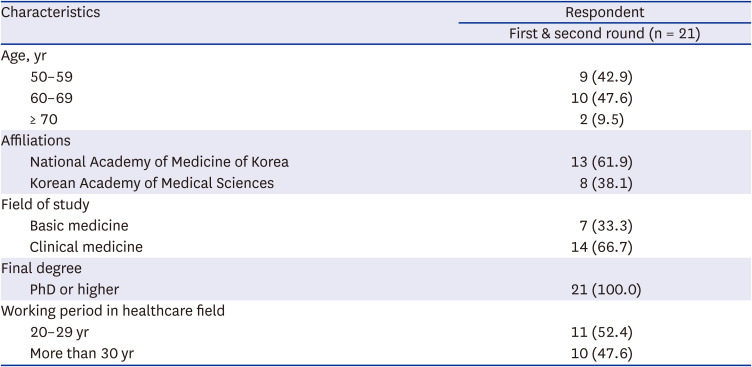
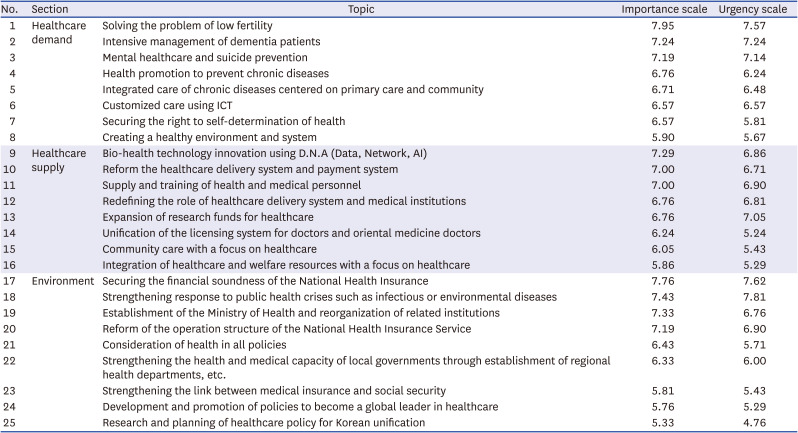
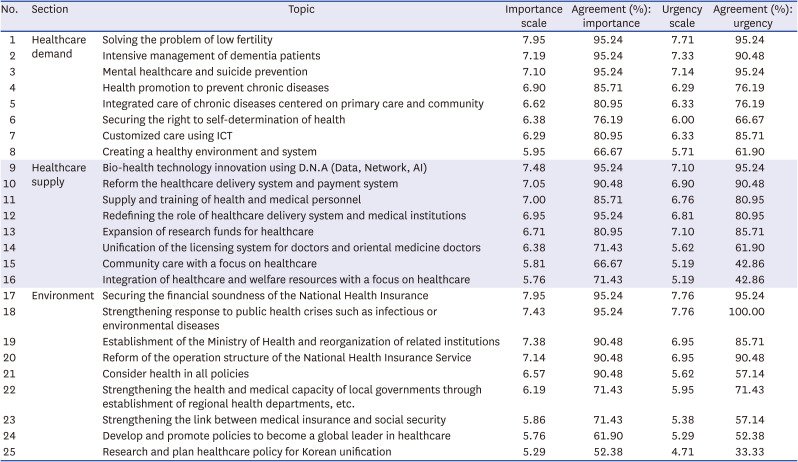





 PDF
PDF Citation
Citation Print
Print



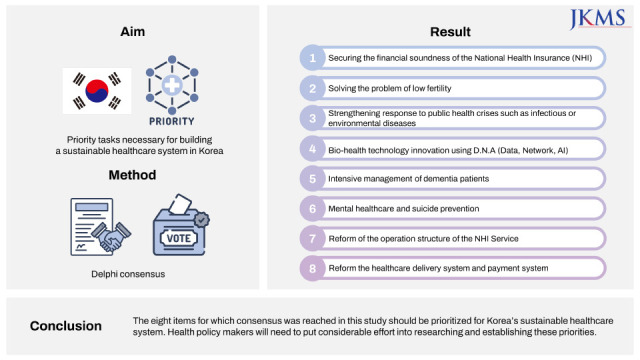
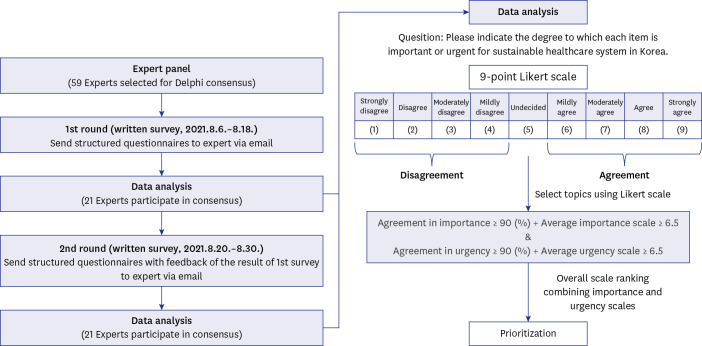
 XML Download
XML Download